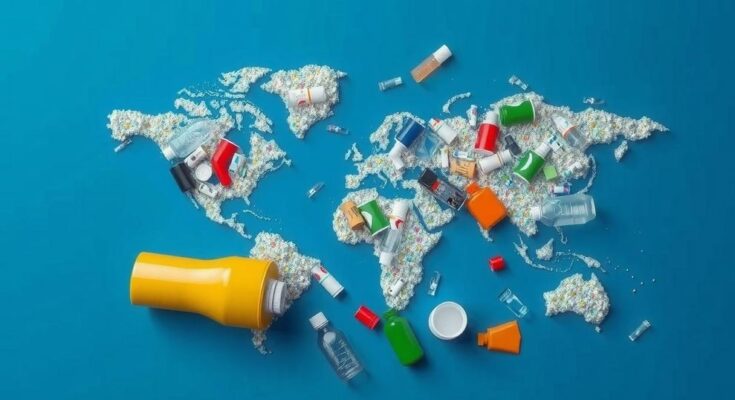Countries at INC-5 in Busan raised alarms over obstructive tactics from a minority of nations hindering efforts to finalize a strong treaty against plastic pollution. Key issues remain unresolved, such as production reduction targets and chemical phase-outs. As the talks approached their conclusion, fears surged about the potential collapse of negotiations without a decisive agreement.
During the recent UN Intergovernmental Negotiating Committee on Plastic Pollution (INC-5) session in Busan, South Korea, numerous countries expressed concerns over the obstruction encountered in reaching a significant global treaty to combat plastic pollution. High-level delegates highlighted that a small contingent of oil-producing nations appeared to hinder negotiations, particularly concerning key aspects such as reducing plastic production and eliminating hazardous chemicals. France’s Energy Minister, Olga Givernet, articulated the urgency of reaching a robust agreement by noting, “We also are worried by the continuing obstruction by the so-called like-minded countries.”
The urgency of the discussions stems from alarming projections that plastic production could triple by 2060, coupled with the fact that over 90 percent of plastic is currently not recycled. Mistrust surrounding a lack of binding commitments persists, as countries like Saudi Arabia and Russia advocate for a focus solely on waste management, resisting calls for globally binding regulations.
Rwanda’s Juliet Kabera expressed dismay at the ongoing resistance, emphasizing the necessity for a substantive treaty by stating, “Rwanda cannot accept a toothless treaty.” Other delegations echoed similar sentiments, voicing that failure to secure a strong agreement would be a detrimental outcome. As the deadline for negotiations approached, the potential for compromise seemed bleak with fears that discussions could collapse and require further sessions in the future.
The discussions at INC-5 are pivotal in shaping an international response to the escalating crisis of plastic pollution. With the global plastic production expected to surge significantly, the need for a cooperative framework to address both production and harmful substances is paramount. However, tensions arise from differing priorities among nations, specifically those that are major oil producers who may view strict regulations as detrimental to their economic interests. During this meeting, delegates were pressed for time, intensifying the need for an actionable and inclusive treaty.
In conclusion, the session in Busan highlighted the urgent need for a cohesive response to plastic pollution, as nations grappled with differing perspectives on treaty provisions. While considerable support exists for ambitious measures to curb plastic production and manage harmful substances, the ongoing obstruction by a minority group threatens to derail progress. The outcome of these negotiations will have lasting implications for global environmental governance and the efficacy of future treaties in addressing plastic pollution.
Original Source: jordantimes.com




